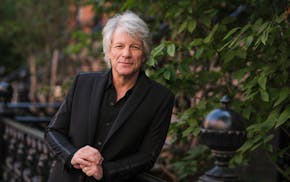Eric Whitacre is a justly renowned choral composer. But he did not show himself off to his best effect at this week's Minnesota Orchestra concerts. He made his conducting debut with the orchestra and the Minnesota Chorale, heard Thursday night at Orchestra Hall, with a program of primarily American music.
In his introductions (unnecessarily repeating the program notes), Whitacre called Minnesota "the center of the choral world," and this was certainly proven by the presence of the Chorale, the strongest performance element of the evening.
Whitacre conducted his own "Five Hebrew Love Songs," with lyrics by his now-wife, Israeli soprano Hila Plitmann, about the early days of their courtship as students at Juilliard. The delicate miniatures were overwhelmed by the heavy arrangement for soprano, chorus and string orchestra.
They might have been more successful as originally written for soprano, piano and solo violin. Plitmann contributed a soaring lyric soprano.
Another large scale choral/orchestra composition was "Equus," a perpetual motion composition, capturing horses running. It was flashy, but ultimately overly bombastic.
Plitmann returned as soloist in "Knoxville: Summer of 1915," Samuel Barber's exquisite evocation of a summer evening. It was given a less-than-successful performance. Plitmann's soprano was a size too small to match the rich orchestration. It didn't help that her diction was spotty. And Whitacre was unable to fully capture the sensuality of the music.
Whitacre also conducted the Chorale in selections from Aaron Copland's "Old American Songs," harmonically rich arrangements of traditional folksongs that never lost the pristine simplicity of the originals. There was a formality and rhythmic stiffness to the reading that spoiled that effortlessness.
The most successful composition and performance was "The River Cam," a gentle tone poem, for solo cello and strings, embodying the pastoral English countryside, in the style of Vaughan Williams. Principal cello Anthony Ross contributed a heart-melting solo performance.
The concert ended with selections from a relatively recent work, 2010's "Songs of Immortality," choral settings of poems by Dylan Thomas and Emily Dickinson. These are dark and intense pieces, reactions to Whitacre turning 40 and to his father's serious illness, and they demonstrated that he is still very much evolving as a composer.
But Whitacre has made his reputation composing beautifully crafted a cappella choral pieces. These remain his strength.
William Randall Beard is a Minneapolis writer.

Review: Zendaya holds the key to tricky relationship drama 'Challengers'
New federal rule bars transgender school bathroom bans, but it likely isn't the final word

Kao Kalia Yang, Edel Rodriguez and others bring us gorgeous new picture books

